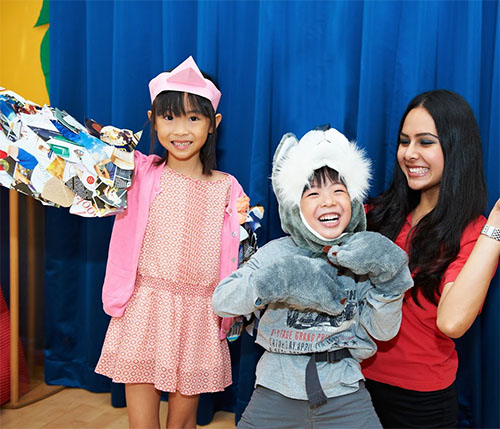
What is a sense of self? Is it something we are born with or something we acquire as we grow up? Why is embodying a healthy sense of self important? And how can we help our children develop positively such a non-tangible quality?
Studies conducted by the Centre for Brain and Cognitive Development at the University of London concluded that most babies are self-aware from the minute they are born. A newborn’s vision and sense of touch help them understand that their body is their own. Studies further show that a newborn who hears another newborn cry in distress will start crying too. These findings suggest that from the very beginning children have a sense of self in relation to their environment and respond accordingly. It could also be argued that they demonstrate empathetic behaviour!

Various Influences on a Child Growing Up
Growing up with a healthy sense of self is important because it affects our attitude towards ourselves and others, and consequently our behaviour, in so many ways. Our sense of self contributes to how we accept differences of opinion and life style, how kind and caring we are towards people and the environment, our levels of motivation, our creativity, how we form relationships, how we communicate, how we feel about our bodies, our health, and so on. Though we are all born with unique DNA, gaining a deep sense of self can take a lifetime to achieve. And we know that external factors influence children enormously from the very start. The physical, emotional and social experiences they have when young will affect their level of happiness, confidence and self-esteem as they grow. The ability to cope in different situations varies from child to child. Personality and support systems play a big part. But there are a number of ways we can help our children gain a better sense of self as they grow. Engagement in drama, as well as other art forms, is one of them.How Can I Help My Child Develop a Sense of Self?
Mastering a creative activity requires discipline and dedication, as well as emotional and physical commitment. But your child does not have to become a prima ballerina or concert pianist in order to benefit from participation in the arts: drama, dance, painting, music, photography, design etc. The process of simply taking part is of benefit. Though better still, regular exposure to one or more creative activities will be of great value to their development of self as they expand their understanding of the world. Why? To begin with, when we experience something, whatever the activity, we feel it, absorb it and as research shows, are more likely to remember it. The process of discovery and learning is made easier. Though every child has their unique learning style, generally, 80 to 90% of their learning will be achieved through experience. As children learn to communicate their individual experiences, verbally and non-verbally, they learn to express their innermost thoughts and feelings. As they do so, they learn about themselves. They develop an understanding of their own emotions – what makes them feel happy or sad for instance. What are their likes and dislikes. They learn how to be kind, courageous and confident while they build up their personal resume of what makes them tick.One of the most important building blocks for all creative activities, and a fundamental focus in our Speech and Drama programmes, is imagination.
When we allow children the freedom to imagine, we hand them the keys to a realm of possibilities. Through artistic expression, whether a staged performance, role-play or improvisation, learning a musical instrument, a specific dance style, fine art, craft making or creative writing, children become aware of their potential, laying the foundations for their future. Global statistics indicate that children who have been schooled in the arts tend to perform better in academic subjects at school. And today, many employers recognise the value of well rounded students to the success of their organisations.“Arts education aids students in skills needed in the workplace: flexibility, the ability to solve problems and communicate; the ability to learn new skills, to be creative and innovative, and to strive for excellence.” – Dr Joseph M Callahan, Vice President, Xerox FoundationBecause the arts (in a free society) celebrate and define all aspects of our lives, they allow participants and viewers a communication platform to all cultures, societies and personal ideals of expression. When we try to understand culture and society, our own and others, we give ourselves the chance to also comprehend our place within it. Exposure to the arts presents opportunities for children to gain ideas and knowledge which they can then use to establish their own moral codes and standards of behaviour, ideally employing them to co-exist peaceably as they communicate openly and tolerantly with those around them. At Julia Gabriel, we empower students to communicate confidently through EduDrama®, a unique learning philosophy inspired by educators passionate about children, language & the arts. For more information about our programmes, workshops and seminars, contact us here.

